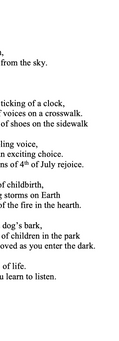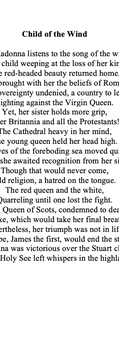
Delphic Verses
a collection of works from Poetry I
Dear Reader,
I would like to explain my chosen title for this collection of poems. Delphic Versus signifies that the poems you’re about to read are a mysterious look into my mind (that of a Junior in College) and how I thought about the world. “Delphic” means mysterious. I wanted to convey, through this word, the mystery that surrounds my poetry. Secondly, the Oracle of Delphi was famous for her prophecies inspired by the Spirit of God (Apollo). Her temple was one of the main religious institutions of ancient Greece and I desired to bring this history into my collection. My poems embody a spirit of religion, primarily revolving around fate and how we see ourselves in the grand scheme of the universe. Through the term “Delphic Verses” I wanted to establish my personal preference for older styles of writing prose and prepare you, reader, for more structured and rhythmic poetry. My themes of fate, mystery, and life versus death are present within all eight poems.
Most of my pieces have an older quality to them, whether that be an attempt at a specific style of poetry, such as an ode or sonnet, or have a key structure to them that is unlike contemporary, free-verse poetry. My style centers around structured poetic themes as my favorite poets were (and remain still) John Keats, Shakespeare, Thomas Hardy, Byron, and Robert Frost. Rhyme, rhythm, and storytelling are the most important things for me to convey through my writing and what I believe to be the best qualities of poetry. Because of this, my writing changes over the course of the collection.
At the beginning of my journey, I copied older styles of poetry, writing a sonnet, “The Nightmare,” in iambic pentameter with older-sounding language, and a lyrical poem, “Pride and Glory,” that references Beowulf—an epic I was reading in tandem to writing. However, as I progressed through the collection, I found it difficult to retain a structured style while seeking a modern twist and still conveying a prominent message or theme. My need, then, was to discover my passions in writing in order to meld every element together. I believe I succeeded in doing this in my poem, “Ode to a Southern Night.” That poem combines the older style with story, rhythm, and contemporary language to develop its theme in a more nuanced and modern way. “Ode to a Southern Night” I believe is my strongest and most successful peace out of all eight poems and it is my favorite one, closely beating “Sailor of the Stream.” I believe that my weakest poem is “The Nightmare,” because, as I said, it is a direct copy of an antique sonnet. After understanding the forms of poetry, I knew I needed to make my poems fit in the modern age. “The Nightmare” does not do it.
“Sounds of Destiny,” which was inspired by three slips of paper that the class was given on the first day which contained objects to inspire a story, begins the collection. This poem opens with clear themes of fate, setting up the rest of the poems to delve into more complex and mysterious stories of destiny. Next comes “The Givers,” which is a poem about leaving home, something integral to that time of my life. Not only does it revolve around the fate of leaving home, but it also develops my love for writing about isolation and pensive thoughts. Third is “Melancholy Penguins,” which is about life and death. Specifically, it is about a species of penguins in New Zealand that throw their elderly off cliffs. I placed this piece third because it enters into my passion for storytelling while also holding true to my theme of fate. “The Nightmare” is fourth because I felt it fit between “Melancholy Penguins” and “Pride and Glory” —where the collection truly begins to tell a story. “The Nightmare” is still fairly vague and nuanced in its message and introduces how older poetry influenced my poems. The fifth is “Pride and Glory.” In its essence, it is the story of a man telling Beowulf to be careful, but I believe it captures the message of being cautious of your hubris. “Child of the Wind” is in sixth because, unlike “Pride and glory,” “Child of the Wind” tells a full story and has a clear message. It tells the story of Mary Queen of Scots and her life as a devout Catholic during the Protestant Revolution. I chose to write about her because she is a fascinating historical figure and I believe the last line summarizes the collection. Delphic verses not only evoke antiquity, but prophecy and memory. “Child of the Wind” confirms there will always be an echo of you in the wind if you leave something for it to remember. Finally, my seventh and eighth poems are “Sailor of the Stream” and “Ode to a Southern Night.” “Sailor of the Stream” is greatly inspired by King Arthur’s story of the Lady of the Lake. Going to a designated destination and capturing history in my storytelling was a process I still use in my writing. Charleston’s old navy base inspired a poem about a ghostly sailor. The poem itself, while emulating an epic poem like “Pride and Glory,” is more contemporary in its language. “Ode to a Southern Night” is last because it captures everything I attempted to achieve in this collection. It has a story, it is rhythmic, it has a structure, and it encapsulates my passion for older poetic styles. This final poem marks my journey from having no knowledge of poetry to writing something of which I am extremely proud. I hope you enjoy Delphic Verses.
Thank you,
Andy







